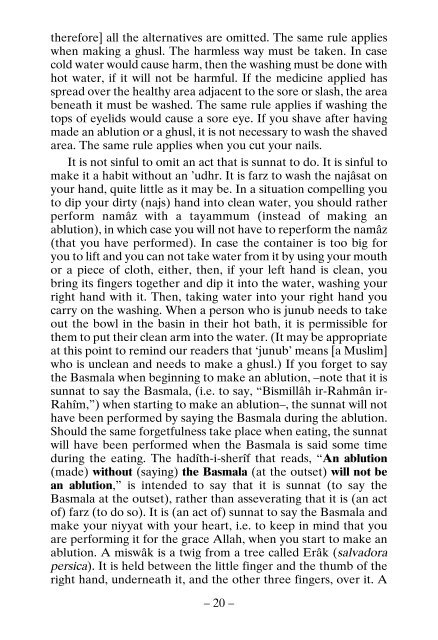O Son !
THE BOOK ‘O SON’ Al-hamdu lillâhi Rabbil ’âlamîn. Wa-s-salâtu wa-s-salâmu ’alâ Rasûlinâ Muhammadin wa Âlihi wa Sahbihi ajma’în. 1– O son! Collecting from books written by the scholars of the Hanafî Madhhab three hundred and sixty hadîth-i-sherîfs and forty-four khabars and also the seven essentials and the five rukns and the seven wâjibs and the fourteen sunnats and the twenty-five mustahabs and the fourteen mufsids of namâz, I have explained them for you. Adapt your acts and deeds to these teachings so that you attain fayz and nejât (salvation)! 2– Also for your information, I have collected a thousand and ninety âdâb (adabs) for you and for other young Muslims like you. If you adapt your actions and acts of worship to these teachings, they will be sufficient for you. If you laze, disobey Allâhu ta’âlâ and cease from these practices and manners, you will be afflicted with slavery and disgrace in the world and subjected to torment in the world to come. If you live up to them and advise your Muslim brothers to do the same, it will be useful for you. They will say blessings over you. And Haqq ta’âlâ will accept their invocations. For, a slave will be pardoned on account of another slave’s invocations for them.
THE BOOK ‘O SON’
Al-hamdu lillâhi Rabbil ’âlamîn. Wa-s-salâtu wa-s-salâmu ’alâ
Rasûlinâ Muhammadin wa Âlihi wa Sahbihi ajma’în.
1– O son! Collecting from books written by the scholars of the
Hanafî Madhhab three hundred and sixty hadîth-i-sherîfs and
forty-four khabars and also the seven essentials and the five rukns
and the seven wâjibs and the fourteen sunnats and the twenty-five
mustahabs and the fourteen mufsids of namâz, I have explained
them for you. Adapt your acts and deeds to these teachings so that
you attain fayz and nejât (salvation)!
2– Also for your information, I have collected a thousand and
ninety âdâb (adabs) for you and for other young Muslims like you.
If you adapt your actions and acts of worship to these teachings,
they will be sufficient for you. If you laze, disobey Allâhu ta’âlâ
and cease from these practices and manners, you will be afflicted
with slavery and disgrace in the world and subjected to torment in
the world to come.
If you live up to them and advise your Muslim brothers to do
the same, it will be useful for you. They will say blessings over you.
And Haqq ta’âlâ will accept their invocations. For, a slave will be
pardoned on account of another slave’s invocations for them.
Create successful ePaper yourself
Turn your PDF publications into a flip-book with our unique Google optimized e-Paper software.
therefore] all the alternatives are omitted. The same rule applies<br />
when making a ghusl. The harmless way must be taken. In case<br />
cold water would cause harm, then the washing must be done with<br />
hot water, if it will not be harmful. If the medicine applied has<br />
spread over the healthy area adjacent to the sore or slash, the area<br />
beneath it must be washed. The same rule applies if washing the<br />
tops of eyelids would cause a sore eye. If you shave after having<br />
made an ablution or a ghusl, it is not necessary to wash the shaved<br />
area. The same rule applies when you cut your nails.<br />
It is not sinful to omit an act that is sunnat to do. It is sinful to<br />
make it a habit without an ’udhr. It is farz to wash the najâsat on<br />
your hand, quite little as it may be. In a situation compelling you<br />
to dip your dirty (najs) hand into clean water, you should rather<br />
perform namâz with a tayammum (instead of making an<br />
ablution), in which case you will not have to reperform the namâz<br />
(that you have performed). In case the container is too big for<br />
you to lift and you can not take water from it by using your mouth<br />
or a piece of cloth, either, then, if your left hand is clean, you<br />
bring its fingers together and dip it into the water, washing your<br />
right hand with it. Then, taking water into your right hand you<br />
carry on the washing. When a person who is junub needs to take<br />
out the bowl in the basin in their hot bath, it is permissible for<br />
them to put their clean arm into the water. (It may be appropriate<br />
at this point to remind our readers that ‘junub’ means [a Muslim]<br />
who is unclean and needs to make a ghusl.) If you forget to say<br />
the Basmala when beginning to make an ablution, –note that it is<br />
sunnat to say the Basmala, (i.e. to say, “Bismillâh ir-Rahmân ir-<br />
Rahîm,”) when starting to make an ablution–, the sunnat will not<br />
have been performed by saying the Basmala during the ablution.<br />
Should the same forgetfulness take place when eating, the sunnat<br />
will have been performed when the Basmala is said some time<br />
during the eating. The hadîth-i-sherîf that reads, “An ablution<br />
(made) without (saying) the Basmala (at the outset) will not be<br />
an ablution,” is intended to say that it is sunnat (to say the<br />
Basmala at the outset), rather than asseverating that it is (an act<br />
of) farz (to do so). It is (an act of) sunnat to say the Basmala and<br />
make your niyyat with your heart, i.e. to keep in mind that you<br />
are performing it for the grace Allah, when you start to make an<br />
ablution. A miswâk is a twig from a tree called Erâk (salvadora<br />
persica). It is held between the little finger and the thumb of the<br />
right hand, underneath it, and the other three fingers, over it. A<br />
– 20 –

















